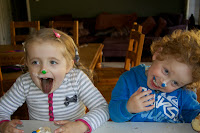
Separating Siblings
Separation is often painful and confusing for any child involved. The experience of loss often precipitates a process of grieving for the child. It is not uncommon for children to internalise the trauma, blaming themselves for the loss of a parent.
But what happens when parents disagree on the primary care arrangements for the children involved. It is not uncommon for parents to disagree on the living arrangements for their children. An issue I have stumbled upon less commonly is that of separating siblings between the two parents.
Although every situation is deserving of consideration, there are real issues to be considered with separating siblings between the two parental households.
In our early days of existence we develop an attachment to our primary caregivers. Attachment refers to the social and emotional bond or connection formed with the significant people in our lives. Relationships of attachment are healthy for our social and emotional development. Despite many siblings protests defying the theory of their attachment with their smelly brother or annoying sister, a strong relationship of attachment also develops between siblings.
Siblings are often best of friends and best of enemies. They are role models and protectors. Siblings can also function in a caring role for one another. They form a bond that is unique to any other relationship they will experience in their lives. In situations where parents have been absent or unable to provide the needed attachment, siblings often compensate for the loss of such a bond from the parent, forming an even stronger bond between themselves.
Separating siblings often leads to siblings questioning why they were removed from one parent when their sibling wasn't. Children will typically internalise these reasons and conclude that they were taken away from mummy because they were naughty or because mummy didn't want them anymore. Children may not verbalise their perspectives, hence harbouring such thoughts for years to come. The impact of which is significant on their social, emotional and mental development.
We have witnessed the negative impacts of separating siblings in foster care. After suffering the loss of the parents, being separated from one's siblings serves to enhance their sense of grief and loss, and is expected to significantly impact long term development.
So would you separate siblings by choice?
The issue to consider is the reason for separating siblings. In considering the unavoidable impact of the parental separation on children, what circumstances are considered reasonable to compound the impact further? The decision to separate siblings needs to be made with care. The decision to separate siblings needs to be considered with the child's needs as priority. Such a decision cannot be considered appropriate if the reasoning involves convenience issues and logistical reasons for the parents. "It's easier to get him to soccer" and "I need to spend mummy daughter time with her" are not reasons to send a son to live with his father. Are these reasons really in consideration of the child or the parent?
Children who are separated individually from other siblings in the family often report feeling rejected and discarded by the family, no longer feeling a part of the family unit. These children often function with bitterness and anger, subsequently labeled as problem children with behaviour issues.
In saying this, parents will make their own choices regarding the care arrangements of their children in separated circumstances. Making efforts to have special time with each of your children irrespective of living arrangements is the goal to be achieved, and perhaps these occasions should be exactly that....special time, not long term living arrangements.
Kurly K

No comments:
Post a Comment